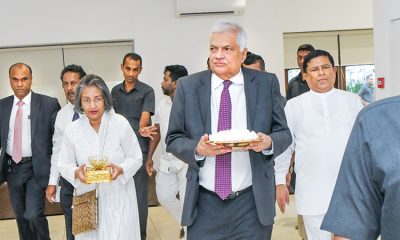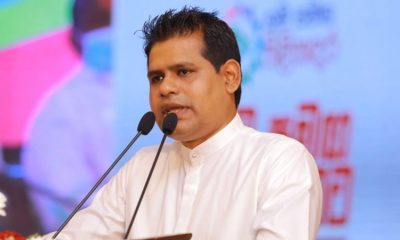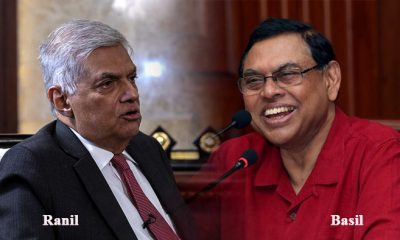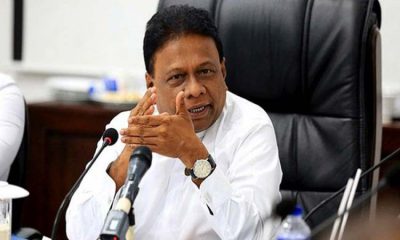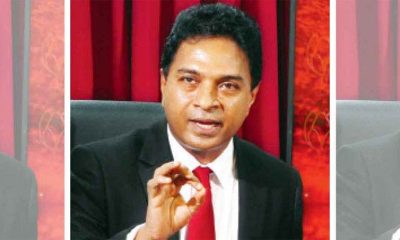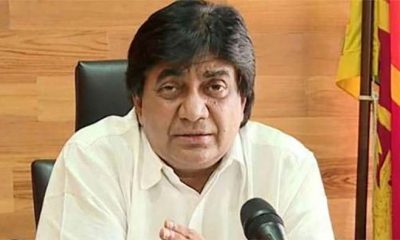News
SLPP’s opposition to privatisation and restructuring discarded: Mahinda, too, votes for Electricity (Amendment) Bill
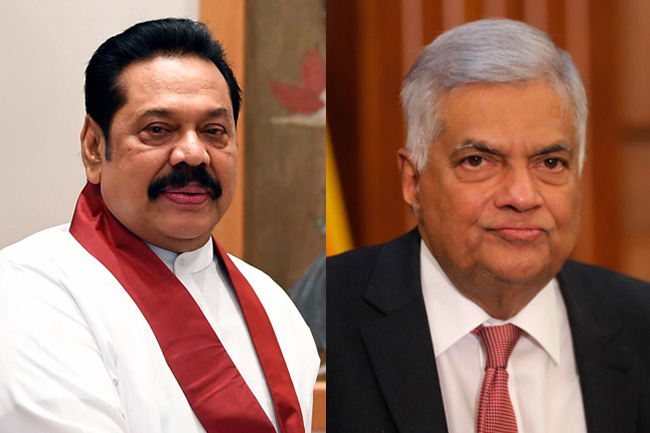
Over a dozen SJB MPs, Maithripala skip vote
By Shamindra Ferdinando
In spite of differences between President Ranil Wickremesinghe and the Sri Lanka Podujana Peramuna (SLPP) over the latter’s call for early General Election, a consensus seems to be emerging on the overall political strategy with the ruling party voting for the Sri Lanka Electricity Amendment Bill, political sources say.
The SLPP has so far declined to officially endorse Ranil Wickremesinghe candidature at the forthcoming Presidential Election though several members publicly supported the UNP leader.
SLPP leader Mahinda Rajapaksa, in spite of publicly declaring his opposition to the government privatization and restructuring plan, voted for the Bill along with his elder brother Chamal Rajapaksa, MP, his son, Shashendra Rajapaksa and General Secretary Sagara Kariyawasam, who recently warned of the SLPP withdrawing support to the government.
However, SLPP National List MP Namal Rajapaksa skipped the vote. Namal Rajapaksa was among about 10 SLPPers absent at the time of the voting.
During the debate JJB MP Vijitha Herath declared that the Bill was enacted to pave the way for the Adanis.
The Supreme Court determined the Bill as a whole is inconsistent with Article 12(1) of the Constitution and shall only be passed by the special majority of Parliament required under Article 84 (2). This inconsistency shall however cease if Clause 1(2) and Clause 1(3) were amended, the SC declared.
Political sources said that the SLPP’s stand was surprising against the backdrop of former President Mahinda Rajapaksa’s declaration on May 12 that the privatization and restructuring programme of the government should he stopped, pending the conclusion of the Presidential Poll later this year.
The following MPs voted for the Bill: Prime Minister Dinesh Gunawardena, Leader of the House Susil Premjayantha, Bandula Gunawardena, Wijeyadasa Rajapakse, Gamini Lokuge, Rear Admiral (retd.) Sarath Weerasekera, Major (retd.) Pradeep Undugoda, Premanath C. Dolawatte, Madura Withanage, Nalin Fernando, Lasantha Alagiyawanna, A.H.M. Fowzie (SJB), Indika Anuruddha, Sisira Jayakody, Prasanna Ranaweera, Nimal Lanza, Kokila Harshani Gunawardena, Milan Jayatilleke, Upul Mahendra Rajapaksa, Sahan Pradeep Vithana, Vudura Wickremanayake, Piyal Nishantha de Silva, Anupa Pasqual, Rohitha Abeygunawardena, Sanjeewa Edirimanne, Lalith Warnakumara Manju, Dilum Amunugama, Lohan Ratwatte, Anuradha Jayarathna, Mahindananda Aluthgamage, Pramitha Bandara Tennakoon, Rohana Dissanayake, Janaka Bandara Tennakoon, Nalaka Bandara Kottegoda, Jeevan Thondaman, S.B. Dissanayake, C. B. Ratnayake, M. Rameshwaram, Ramesh Pathirana, Manusha Nanayakkara, Mohan de Silva, Geetha Kumarasinghe, Sampath Atukorale, Isuru Dodangoda, Kanchana Wijesekera, D.V. Chanaka, Ajith Rajapaksha, Chamal Rajapaksha, Douglas Devananda, Carder Masthan, Seevanesathurai Chandrakanthan, Wimalaweera Dissanayake, S.M.M. Musharaff, D. Weerasinghe, Kapila Nuwan Atukorale, Mahinda Rajapaksa, D. B. Herath, Shantha Bandara, Johnston Fernando, U.K. Sumith Udukumbura, Samanpriya Herath, Anura Priyadarshana Yapa, Ashoka Priyantha, Priyankara Jayaratne, Ali Sabri Raheem, Shehan Semasinghe, S.M. Chandrasena, S. C. Muthukumarana, M. G. Weerasena, Siripala Gamlath, Jagath Samarawickrema, Nimal Siripala de Silva, Thenuka Vidanagamage, A Aravinda Kumar, Janaka Tissakuttiarachchi, Major (retd) Sudarshana Denipitiya, Vijitha Berugoda, Shashendra Rajapaksha, Dr. Gayashan Nawanandana, Kumarasiri Ratnayake, Pavitradevi Wanniarachchi, Janaka Wakkumbura, Premalal Jayasekera, John Seneviratne, Akila Saliya Ellawela, Muditha Prishanthi, Ranjith Siyambalapitiya, Kanaka Herath, Tharaka Balasuriya, Sudath Manjula, Rajika Wickremesinghe, Ali Sabry, Tiran Alles, Dr. Seetha Armbepola, Suren Raghavan, Wajira Abeywardena, Jayantha Ketagoda, Sagara Kariyawasam, Yadamini Gunawardena, Manjula Disanayake, Ranjith Bandara, Jayantha Weerasinghe and Mohamed Faleel Marjan.
Of the 103 MPs who voted for the Bill, two represented the SJB (Manusha Nanayakkara and A.H.M. Fowzie).
Sources said that Udayakantha Gunatilleke, though being present in Parliament at the time of the voting, hadn’t voted. The JJB’s three MPs -Anurta Kuamar Dissanayake, Vijitha Herath and Dr. Harini Amarasuriya – voted against the Bill, whereas the 10-member Tamil National Alliance (TNA) abstained.
Twenty MPs who had been elected on the SLPP ticket at the last General Election voted against the Bill, along with 36 SJB MPs. The SJB won 54 seats at the last General Election.
Former President Maithripala Sirisena (SLPP/Polonnaruwa) skipped the vote, whereas other SLFP MPs voted for the Bill. They included Wijeyadasa Rajapakse and Nimal Siripala de Silva, leading two factions in the SLFP.
Sources said that the SLPP’s backing for the Bill meant that the May 12 statement regarding their opposition to privatization and restructuring was not relevant.
They said that the SLPP was most likely to support the Economic Transformation Bill (ETB) that had been challenged by the SJB in the Supreme Court.
The Supreme Court summarized the Constitutionality of Sri Lanka Electricity Bill as follows:
The Bill as a whole is inconsistent with Article 12(1) of the Constitution and shall only be passed by a special majority of Parliament required under Article 84 (2). This inconsistency shall however cease if Clause 1(2) and Clause 1(3) are amended as set out in the summary of the Determination of the Supreme Court.
Clauses 3(6) (a) and 10(1) (c) are inconsistent with Article 12(1) of the Constitution and shall only be passed by the special majority required under Article 84(2). However, the inconsistency shall cease if those Clauses are amended as set out in the summary of the Determination of the Supreme Court.
The first proviso to Clause 11(1) of the Bill is inconsistent with Article 12(1) of the Constitution and shall only be passed by the special majority of Parliament required under Article 84 (2). However, the said inconsistency shall cease if the Clause is amended as set out in the summary of the Determination of the Supreme Court.
Clause 17 is inconsistent with Article 12(1) of the Constitution and shall only be passed by the special majority of Parliament required under Article 84(2). The said inconsistency shall however cease and Clause 17 may be passed by a simple majority if the Clause is amended as set out in the summary of the Determination of the Supreme Court.
Clause 18(3) (e) (ii) of the Bill is inconsistent with the provisions of Article 12(1) and shall only be passed by the special majority of Parliament required under Article 84(2). The said inconsistency shall however cease if Clause 18(3) is amended as set out in the Summary of the Determination of the Supreme Court.
Clause 18(3) (f) of the Bill is inconsistent with Article 12(1) and Article 14(1) (g) of the Constitution and shall only be passed by the special majority of Parliament required under Article 84(2). However, the said inconsistency shall cease if the Clause 18(3) (f) is amended as set out in the summary of the Determination of the Supreme Court.
Clause 18(5) (b) (ii) is inconsistent with Article 12(1) of the Constitution and shall only be passed by the special majority of Parliament required under Article 84(2). The said inconsistency shall however cease if Clause 18(5) (b) (ii) is amended as set out in the summary of the Determination of the Supreme Court.
Clause 21 and Clause 23 are inconsistent with Article 12(1) of the Constitution and shall only be passed by the special majority of Parliament required under Article 84(2). The said inconsistency shall however cease if those Clauses are amended as set out in the summary of the Determination of the Supreme Court.
Clause 38 (2) of the Bill is inconsistent with Article 12(1) of the Constitution and shall only be passed by the special majority required under Article 84(2). The said inconsistency shall cease if Clause 38(2) is amended as per the summary of the Determination of the Supreme Court.
Clause 48 is violative of Article 4(a) read together with Article 3 and 76 and hence needs to be passed by the special majority of Parliament and approved by the People at a Referendum.
The definition of ‘national grid’ in Clause 53 of the Bill is inconsistent with Article 12(1) of the Constitution and shall be passed by the special majority of Parliament required under Article 84(2). However, the said inconsistency shall cease if the said definition is amended as set out in the summary of the Determination of the Supreme Court.
News
US sports envoys to Lanka to champion youth development

The U.S. Embassy in Colombo welcomed the U.S. Sports Envoys to Sri Lanka, former National Basketball Association (NBA) and Women’s National Basketball Association (WNBA) players Stephen Howard and Astou Ndiaye, from June 8 through 14.
The Public Diplomacy section of the U.S. Embassy said that it would launch a weeklong basketball program intended to harness the unifying power of sports, made possible through collaboration with Foundation of Goodness and IImpact Hoop Lab.
While in Sri Lanka, Howard and Ndiaye, both retired professional basketball players, will conduct a weeklong program, Hoops for Hope: Bridging Borders through Basketball. The Sports Envoys will lead basketball clinics and exhibition matches and engage in leadership sessions in Colombo and Southern Province for youth aged 14-18 from Northern, Uva, Eastern and Western Provinces, offering skills and leadership training both on and off the court. The U.S. Envoys will also share their expertise with the Sri Lanka Basketball Federation, national coaches, and players, furthering the development of basketball in the country. Beyond the clinics, they will collaborate with Sri Lankan schoolchildren to take part in a community service project in the Colombo area.
“We are so proud to welcome Stephen and Astou as our Sports Envoys to Sri Lanka, to build on the strong people-to-people connections between the United States and Sri Lanka,” said U.S. Ambassador Julie Chung. “The lessons that will be shared by our Sports Envoys – communication, teamwork, resilience, inclusion, and conflict resolution – are essential for leadership development, community building, equality, and peace. The U.S. Sports Envoy program is a testament to our belief that sports can be a powerful tool in promoting peace and unity.”
News
Rahuman questions sudden cancellation of leave of CEB employees

SJB Colombo District MP Mujibur Rahuman in parliament demanded to know from the government the reasons for CEB suspending the leave of all its employees until further notice from Thursday.
MP Rahuman said that the CEB has got an acting General Manager anew and the latter yesterday morning issued a circular suspending leave of all CEB employees with immediate effect until further notice.
“We demand that Minister Kanchana Wijesekera should explain this to the House. This circular was issued while this debate on the new Electricity Amendment Bill was pending. There are many who oppose this Bill. The Minister must tell parliament the reason for the urge to cancel the leave of CEB employees,” the MP said.However, Speaker Mahinda Yapa Abeywardena prevented Minister Wijesekera responding to the query and said that the matter raised by MP Rahuman was not relevant.
News
CIPM successfully concludes 8th Annual Symposium

The Chartered Institute of Personnel Management (CIPM) successfully concluded the 8th Annual CIPM Symposium, which took place on 31st May 2024. Themed “Nurturing the Human Element—Redefining HRM in a Rapidly Changing World,” the symposium underscored the pivotal role of human resource management (HRM) in today’s dynamic global landscape. Since its inception in 1959, CIPM has been dedicated to advancing the HR profession through education, professional development, and advocacy, solidifying its position as Sri Lanka’s leading professional body for HRM.
Ken Vijayakumar, the President of the CIPM, graced the occasion as the chief guest. The symposium commenced with the welcome address by the Chairperson, Prof. Arosha Adikaram, followed by the Web Launch of the Symposium Proceedings and Abstract Book by the CIPM President. The event featured distinguished addresses, including a speech by Chief Guest Ken Vijayakumar, President of CIPM, and an address by Guest of Honor Shakthi Ranatunga, Chief Operating Officer of MAS Holdings Pvt. Ltd., Sri Lanka.
The symposium also featured an inspiring keynote address by Prof. Mario Fernando, Professor of Management and Director of the Centre for Cross Cultural Management (CCCM) at the University of Wollongong, Australia.
Vote of Thanks of the inauguration session was delivered by Dr. Dillanjani Weeratunga, Symposium Co-chair.
The symposium served as a comprehensive platform for researchers to present their findings across a wide range of critical topics in HRM. These included Cultural Diversity and Inclusion, Talent Development and Retention, Ethical Leadership and Corporate Social Responsibility, Adapting to Technological Advancements, Mental Health and Well-being at Work, Global Workforce Challenges, Employee Empowerment, and Reskilling and Upskilling.
The plenary session was led by Prof. Wasantha Rajapakse. Certificates were awarded to the best paper presenters during the valedictory session, followed by a vote of thanks delivered by Kamani Perera, Manager of Research and Development.
The annual symposium of CIPM was a truly inclusive event, attracting a diverse audience that spanned undergraduates, graduates, working professionals, research scholars and lecturers. This widespread interest highlights the symposium’s significance in the field of HRM, offering a unique opportunity for everyone to network and learn from scholarly brains.The CIPM International Research Symposium was sponsored by Hambantota International Port, Sri Lanka Institute of Information Technology (SLIIT), E B Creasy & Co. PLC, and Print Xcel Company.


